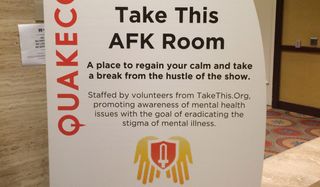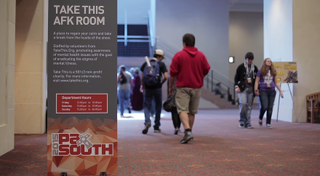The AFK Room: more than just an oasis amid the roar of QuakeCon

I passed it probably a dozen times during QuakeCon weekend: a closed door off the hotel's main thoroughfare, marked with a standing sign inviting attendees to take a break from the show. It certainly felt like a good idea: as friendly as the boisterous crowds of QuakeCon are, it's an easy place to become overwhelmed or anxious.
The AFK room, however, isn't just a spot for some peace and quiet amidst the amiable roar of the convention. It's a place for people who are in crisis to find help. Late Sunday night I spoke with Russ Pitts, co-founder of Take This, the charity providing and staffing the AFK room at Quakecon.
"It's not just a quiet room for us," said Pitts, a former games journalist and co-founder of Polygon. "We're a mental health awareness and education charity, so we don't want to have a room where it's not monitored or where people can't get more help than just a quiet space if they need it."
Take This was founded in 2012 by Pitts, game journalist Susan Arendt, and clinical psychologist Dr. Mark Kline, after freelance writer Matt Hughes took his own life. The idea for the charity arose from conversations between colleagues of Hughes, who were unaware that he had suffered from depression. "What kind of resources would we have wanted to create to help someone like Matt understand that it's okay to not be okay, it's okay to talk to people about these issues?" Pitts and others asked themselves. "And Take This grew out of that."

The first AFK room arrived at PAX East in 2014, and according to Pitts, they're now visited by roughly 500 people a day during PAX conventions. This is the first year QuakeCon has provided an AFK room, though I expect the practice will continue to in the future—Pete Hines, Vice President of PR and Marketing at Bethesda Softworks, is a member of the governing board of Take This. Pitts said the charity is also reaching out to other conventions. "We're talking to organizations like GenCon. We're going to have some kind of presence at DragonCon this year in Atlanta."
"Every time we do this, including here at QuakeCon, we have people come in who are in states of extreme duress, who are experiencing emergent crisis of some kind, whether an anxiety attack or panic attack or suicidal ideation." As a result, Take This provides access to trained professionals for event attendees, and also provide training to convention staff and volunteers on mental health awareness.
Due to the variation of laws from state to state, Take This doesn't offer services or therapy in the AFK room, but instead provide information about how and where visitors can find local help.
The biggest gaming news, reviews and hardware deals
Keep up to date with the most important stories and the best deals, as picked by the PC Gamer team.
"As far as mental health goes, the legalities are different in every state, "said Pitts. "We don't do clinical services here, we don't do therapy in the room, we don't diagnose in the room, but our clinicians do offer people advice about local resources, and they're trained in therapy so they know the difference between having a conversation and dispensing therapy. So, they know where to stop."

Chris started playing PC games in the 1980s, started writing about them in the early 2000s, and (finally) started getting paid to write about them in the late 2000s. Following a few years as a regular freelancer, PC Gamer hired him in 2014, probably so he'd stop emailing them asking for more work. Chris has a love-hate relationship with survival games and an unhealthy fascination with the inner lives of NPCs. He's also a fan of offbeat simulation games, mods, and ignoring storylines in RPGs so he can make up his own.
Most Popular


